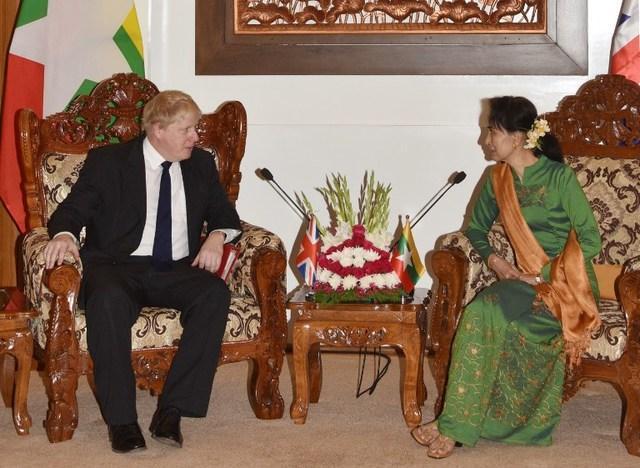UK’s Johnson meets Myanmar’s Suu Kyi on Rohingya crisis
NAYPYIDAW – Agence France-Presse

British Foreign Minister Boris Johnson met with Aung San Suu Kyi in Myanmar’s capital on Feb. 11 to press for action on the Rohingya crisis, as the country faces mounting pressure to punish troops accused of atrocities against the Muslim minority.
Johnson spoke with the embattled Myanmar leader, whose reputation among the international community has plunged over her handling of the crisis, in Naypyidaw while on a four-day tour in Asia.
The meeting followed Johnson’s visit to a refugee camp in Bangladesh’s Cox’s Bazar district, where nearly 700,000 Rohingya have sought sanctuary in squalid settlements since a Myanmar army crackdown in northern Rakhine last August.
The U.N. has accused Myanmar of driving the Muslim minority across the border in an ethnic cleansing campaign. Doctors Without Borders estimates at least 6,700 Rohingya died in the first month of violence.
But Myanmar has staunchly denied the charges and blocked U.N. investigators from the conflict zone, souring relations with a host of western allies.
Fresh reports of mass graves in Rakhine -- and the arrest of two Reuters journalists investigating an alleged massacre -- have heaped new pressure on Suu Kyi to condemn the army, who she is in a delicate power-sharing arrangement with.
But the Nobel laureate has refused to change tack and is accused by critics of bunkering down in a siege mentality.
On Feb. 11 Johnson and Suu Kyi “discussed in an open and friendly manner the latest developments in Rakhine State, including planning for the reception of returnees who fled,” Myanmar’s foreign ministry said in a Facebook post alongside photos of the pair meeting.
Ahead of the talks the U.K.’s foreign office said Johnson would press for an “end to the suffering in Rakhine and the safe and voluntary return of the refugees.”
Myanmar and Bangladesh have inked a deal to bring refugees back to northern Rakhine, but repatriation has yet to begin.
Many Rohingya do not feel safe returning to a country where they have faced violent persecution and decades of discrimination at the hands of a state that has denied them citizenship.
Others have no home to return to after their villages were torched in the military crackdown.
















